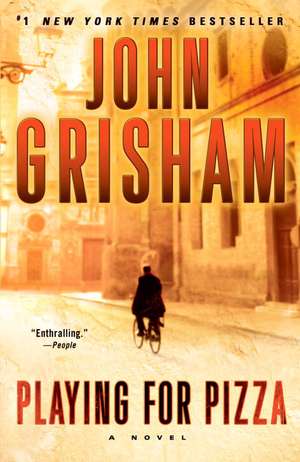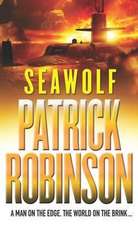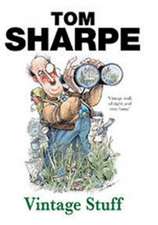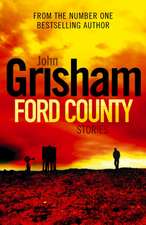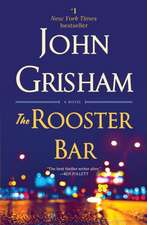Playing for Pizza
Autor John Grishamen Limba Engleză Paperback – 31 iul 2011
Vezi toate premiile Carte premiată
Colorado Blue Spruce Award (2009)
After providing what is arguably the worst single performance in the history of the NFL, third-string quarterback Rick Dockery becomes a national laughingstock. Cut by the Cleveland Browns, and shunned by every other team, Rick insists that his agent find a team that does need him. Against enormous odds, Rick lands a job—as the starting quarterback for the Mighty Panthers . . . of Parma, Italy. The Parma Panthers desperately want a former NFL player—any former NFL player—at their helm. And now they’ve got Rick, who knows nothing about Parma (not even where it is) and doesn’t speak a word of Italian. To say that Italy—the land of fine wines, extremely small cars, and football americano—holds a few surprises for Rick Dockery would be something of an understatement.
| Toate formatele și edițiile | Preț | Express |
|---|---|---|
| Paperback (3) | 53.68 lei 23-34 zile | +19.94 lei 6-10 zile |
| CORNERSTONE – 26 mai 2011 | 53.68 lei 23-34 zile | +19.94 lei 6-10 zile |
| Dell Publishing Company – 31 dec 2011 | 55.61 lei 3-5 săpt. | |
| Bantam – 31 iul 2011 | 94.47 lei 3-5 săpt. |
Preț: 94.47 lei
Nou
Puncte Express: 142
Preț estimativ în valută:
18.08€ • 18.68$ • 15.05£
18.08€ • 18.68$ • 15.05£
Carte disponibilă
Livrare economică 05-19 martie
Preluare comenzi: 021 569.72.76
Specificații
ISBN-13: 9780385344005
ISBN-10: 0385344007
Pagini: 260
Dimensiuni: 137 x 202 x 15 mm
Greutate: 0.2 kg
Editura: Bantam
ISBN-10: 0385344007
Pagini: 260
Dimensiuni: 137 x 202 x 15 mm
Greutate: 0.2 kg
Editura: Bantam
Notă biografică
Since first publishing A Time to Kill in 1988, Grisham has written one novel a year (his other books are The Firm, The Pelican Brief, The Client, The Chamber, The Rainmaker, The Runaway Jury, The Partner, The Street Lawyer, The Testament, The Brethren, A Painted House, Skipping Christmas, The Summons, The King of Torts, Bleachers, The Last Juror, and The Broker) and all of them have become international bestsellers. The Innocent Man (October 2006) marks his first foray into non-fiction.
Grisham lives with his wife Renee and their two children Ty and Shea. The family splits their time between their Victorian home on a farm in Mississippi and a plantation near Charlottesville, VA.
From the Paperback edition.
Grisham lives with his wife Renee and their two children Ty and Shea. The family splits their time between their Victorian home on a farm in Mississippi and a plantation near Charlottesville, VA.
From the Paperback edition.
Extras
Chapter One
It was a hospital bed, that much appeared certain, though certainty was coming and going. It was narrow and hard and there were shiny metal railings standing sentrylike along the sides, preventing escape. The sheets were plain and very white. Sanitary. The room was dark, but sunlight was trying to creep around the blinds covering the window.
He closed his eyes again; even that was painful. Then he opened them, and for a long silent minute or so he managed to keep the lids apart and focus on his cloudy little world. He was lying on his back and pinned down by firmly tucked sheets. He noticed a tube dangling to his left, running down to his hand, then disappearing up somewhere behind him. There was a voice in the distance, out in the hallway. Then he made the mistake of trying to move, just a slight adjustment of the head, and it didn't work. Hot bolts of pain hit his skull and neck and he groaned loudly.
"Rick. Are you awake?"
The voice was familiar, and quickly a face followed it. Arnie was breathing on him.
"Arnie?" he said with a weak, scratchy voice, then he swallowed.
"It's me, Rick, thank God you're awake."
Arnie the agent, always there at the important moments.
"Where am I, Arnie?"
"You're in the hospital, Rick."
"Got that. But why?"
"When did you wake up?" Arnie found a switch, and a light came on beside the bed.
"I don't know. A few minutes ago."
"How do you feel?"
"Like someone crushed my skull."
"Close. You're gonna be fine, trust me."
Trust me, trust me. How many times had he heard Arnie ask for trust? Truth was, he'd never completely trusted Arnie and there was no plausible reason to start now. What did Arnie know about traumatic head injuries or whatever mortal wound someone had inflicted?
Rick closed his eyes again and breathed deeply. "What happened?" he asked softly.
Arnie hesitated and ran a hand over his hairless head. He glanced at his watch, 4:00 p.m., so his client had been knocked out for almost twenty-four hours. Not long enough, he thought, sadly.
"What's the last thing you remember?" Arnie asked as he carefully put both elbows on the bed's railing and leaned forward.
After a pause, Rick managed to say, "I remember Bannister coming at me."
Arnie smacked his lips and said, "No, Rick. That was the second concussion, two years ago in Dallas, when you were with the Cowboys." Rick groaned at the memory, and it wasn't pleasant for Arnie either, because his client had been squatting on the sideline looking at a certain cheerleader when the play came his way and he was squashed, helmetless, by a ton of flying bodies. Dallas cut him two weeks later and found another third-string quarterback.
"Last year you were in Seattle, Rick, and now you're in Cleveland, the Browns, remember?"
Rick remembered and groaned a bit louder. "What day is it?" he asked, eyes open now.
"Monday. The game was yesterday. Do you recall any of it?" Not if you're lucky, Arnie wanted to say. "I'll get a nurse. They've been waiting."
"Not yet, Arnie. Talk to me. What happened?"
"You threw a pass, then you got sandwiched. Purcell came on a weak-side blitz and took your head off. You never saw him."
"Why was I in the game?"
Now, that was an excellent question, one that was raging on every sports radio show in Cleveland and the upper Midwest. Why was HE in the game? Why was HE on the team? Where in the hell did HE come from?
"Let's talk about it later," Arnie said, and Rick was too weak to argue. With great reluctance, his wounded brain was stirring slightly, shaking itself from its coma and trying to awaken. The Browns. Browns Stadium, on a very cold Sunday afternoon before a record crowd. The play-offs, no, more than that—the AFC title game.
The ground was frozen, hard as concrete and just as cold.
A nurse was in the room, and Arnie was announcing, "I think he's snapped out of it."
"That's great," she said, without much enthusiasm. "I'll go find a doctor." With even less enthusiasm.
Rick watched her leave without moving his head. Arnie was cracking his knuckles and ready to bolt. "Look, Rick, I need to get going."
"Sure, Arnie. Thanks."
"No problem. Look, there's no easy way to say this, so I'll just be blunt. The Browns called this morning—Wacker—and, well, they've released you." It was almost an annual ritual now, this postseason cutting.
"I'm sorry," Arnie said, but only because he had to say it.
"Call the other teams," Rick said, and certainly not for the first time.
"Evidently I won't have to. They're already calling me."
"That's great."
"Not really. They're calling to warn me not to call them. I'm afraid this might be the end of the line, kid."
There was no doubt it was the end of the line, but Arnie just couldn't find the candor. Maybe tomorrow. Eight teams in six years. Only the Toronto Argonauts dared to sign him for a second season. Every team needed a backup to their backup quarterback, and Rick was perfect for the role. Problems started, though, when he ventured onto the field.
"Gotta run," Arnie said, glancing at his watch again. "And listen, do yourself a favor and keep the television turned off. It's brutal, especially ESPN." He patted his knee and darted from the room. Outside the door there were two thick security guards sitting in folding chairs, trying to stay awake.
Arnie stopped at the nurses' station and spoke to the doctor, who eventually made his way down the hall, past the security guards, and into Rick's room. His bedside manner lacked warmth—a quick check of the basics without much conversation. Neurological work to follow. Just another garden-variety brain concussion, isn't this the third one?
"I think so," Rick said.
"Thought about finding another job?" the doctor asked.
"No."
Perhaps you should, the doctor thought, and not just because of your bruised brain. Three interceptions in eleven minutes should be a clear sign that football is not your calling. Two nurses appeared quietly and helped with the tests and paperwork. Neither said a word to the patient, though he was an unmarried professional athlete with notable good looks and a hard body. And at that moment, when he needed them, they could not have cared less.
As soon as he was alone again, Rick very carefully began looking for the remote. A large television hung from the wall in the corner. He planned to go straight to ESPN and get it over with. Every movement hurt, and not just his head and neck. Something close to a fresh knife wound ached in his lower back. His left elbow, the non-throwing one, throbbed with pain.
Sandwiched? He felt like he'd been flattened by a cement truck.
The nurse was back, holding a tray with some pills. "Where's the remote?" Rick asked.
"Uh, the television's broke."
"Arnie pulled the plug, didn't he?"
"Which plug?"
"The television."
"Who's Arnie?" she asked as she tinkered with a rather large needle.
"What's that?" Rick asked, forgetting Arnie for a second.
"Vicodin. It'll help you sleep."
"I'm tired of sleeping."
"Doctor's orders, okay. You need rest, and lots of it." She drained the Vicodin into his IV bag and watched the clear liquids for a moment.
"Are you a Browns fan?" Rick asked.
"My husband is."
"Was he at the game yesterday?"
"Yes."
"How bad was it?"
"You don't want to know."
***
When he awoke, Arnie was there again, sitting in a chair beside the bed and reading the Cleveland Post. At the bottom of the front page, Rick could barely make out the headline "Fans Storm Hospital."
"What!" Rick said as forcefully as possible.
Arnie snatched the paper down and bolted to his feet. "Are you okay, kid?"
"Wonderful, Arnie. What day is it?"
"Tuesday, early Tuesday morning. How do you feel, kid?"
"Give me that newspaper."
"What do you want to know?"
"What's going on, Arnie?"
"What do you want to know?"
"Everything."
"Have you watched television?"
"No. You pulled the plug. Talk to me, Arnie."
Arnie cracked his knuckles, then walked slowly to the window, where he barely opened the blinds. He peered through them, as if trouble were out there. "Yesterday some hooligans came here and made a scene. Cops handled it well, arrested a dozen or so. Just a bunch of thugs. Browns fans."
"How many?"
"Paper said about twenty. Just drunks."
"And why did they come here, Arnie? It's just you and me—agent and player. The door's closed. Please fill in the blanks."
"They found out you were here. A lot of folks would like to take a shot at you these days. You've had a hundred death threats. Folks are upset. They're even threatening me." Arnie leaned against the wall, a flash of smugness because his life was now worth being threatened. "You still don't remember?" he asked.
"No."
"Browns are up seventeen to zip over the Broncos with eleven minutes to go. Zip doesn't come close to describing the ass-kicking. After three quarters, the Broncos have eighty-one yards in total offense, and three, count 'em, three first downs. Anything?"
"No."
"Ben Marroon is at quarterback because Nagle pulled a hamstring in the first quarter."
"I remember that now."
"With eleven minutes to go, Marroon gets drilled on a late hit. They carry him off. No one's worried because the Browns' defense could stop General Patton and his tanks. You take the field, third and twelve, you throw a beautiful pass in the flat to Sweeney, who, of course, plays for the Broncos, and forty yards later he's in the end zone. Remember any of this?"
Rick slowly closed his eyes and said, "No."
"Don't try too hard.
"Both teams punt, then the Broncos fumble. With six minutes to go, on a third and eight, you check off at the line and throw to Bryce on a hook, but the ball is high and is picked off by somebody in a white jersey, can't recall his name but he sure can run, all the way. Seventeen to fourteen. The place is getting tense, eighty thousand plus. A few minutes earlier they were celebrating. First Super Bowl ever, all that jazz. Broncos kick off, Browns run the ball three times because Cooley ain't about to send in a pass play, and so the Browns punt. Or try to. Snap gets fumbled, Broncos get the ball on the Browns' thirty-four-yard line, which is no problem whatsoever because in three plays the Browns' defense, which is really, really pissed at this point, stuffs them for fifteen yards, out of field goal range. Broncos punt, you take over at your own 6, and for the next four minutes manage to cram the ball into the middle of the defensive line. The drive stalls at midfield, third and ten, forty seconds to go. Browns are afraid to pass and even more afraid to punt. I don't know what Cooley sends in, but you check off again, fire a missile to the right sideline for Bryce, who's wide open. Right on target."
Rick tried to sit up, and for a moment forgot about his injuries. "I still don't remember."
"Right on target, but much too hard. It hits Bryce in the chest, bounces up, and Goodson grabs it, gallops to the promised land. Browns lose twenty-one to seventeen. You're on the ground, almost sawed in half. They put you on a stretcher, and as they roll you off the field, half the crowd is booing and the other half is cheering wildly. Quite a noise, never heard anything like it. A couple of drunks jump from the stands and rush the stretcher—they would've killed you—but security steps in. A nice brawl ensues, and it, too, is all over the talk shows."
Rick was slumped over, low in the bed, lower than ever, with his eyes closed and his breathing quite labored. The headaches were back, along with the sharp pains in the neck and along the spine. Where were the drugs?
"Sorry, kid," Arnie said. The room was nicer in the darkness, so Arnie closed the blinds and reassumed his position in the chair, with his newspaper. His client appeared to be dead.
The doctors were ready to release him, but Arnie had argued strongly that he needed a few more days of rest and protection. The Browns were paying for the security guards, and they were not happy about it. The team was also covering the medicals, and it wouldn't be long before they complained.
And Arnie was fed up, too. Rick's career, if you could call it that, was over. Arnie got 5 percent, and 5 percent of Rick's salary wasn't enough to cover expenses. "Are you awake, Rick?"
"Yes," he said, with his eyes still closed.
"Listen to me, okay."
"I'm listening."
"The hardest part of my job is telling a player that it's time to quit. You've played all your life, it's all you know, all you dream about. No one is ever ready to quit. But, Rick, ole buddy, it's time to call it quits. There are no options."
"I'm twenty-eight years old, Arnie," Rick said, with his eyes open. Very sad eyes. "What do you suggest I do?"
"A lot of guys go into coaching. And real estate. You were smart—you got your degree."
"My degree is in phys ed, Arnie. That means I can get a job teaching volleyball to sixth graders for forty thousand a year. I'm not ready for that."
Arnie stood and walked around the end of the bed, as if deep in thought. "Why don't you go home, get some rest, and think about it?"
"Home? Where is home? I've lived in so many different places."
"Home is Iowa, Rick. They still love you there." And they really love you in Denver, Arnie thought, but wisely kept it to himself.
The idea of being seen on the streets of Davenport, Iowa, terrified Rick, and he let out a soft groan. The town was probably humiliated by the play of its native son. Ouch. He thought of his poor parents, and closed his eyes.
Arnie glanced at his watch, then for some reason finally noticed that there were no get-well cards or flowers in the room. The nurses told him that no friends had stopped by, no family, no teammates, no one even remotely connected to the Cleveland Browns. "I gotta run, kid. I'll drop by tomorrow."
Walking out, he nonchalantly tossed the newspaper on Rick's bed. As soon as the door closed behind him, Rick grabbed it, and soon wished he had not. The police estimated a crowd of fifty had staged a rowdy demonstration outside the hospital. Things got ugly when a TV news crew showed up and began filming. A window was smashed, and a few of the drunker fans stormed the ER check-in, supposedly looking for Rick Dockery. Eight were arrested. A large photo—front page beneath the fold—captured the crowd before the arrests. Two crude signs could be read clearly: "Pull the Plug Now!" and "Legalize Euthanasia."
From the Paperback edition.
It was a hospital bed, that much appeared certain, though certainty was coming and going. It was narrow and hard and there were shiny metal railings standing sentrylike along the sides, preventing escape. The sheets were plain and very white. Sanitary. The room was dark, but sunlight was trying to creep around the blinds covering the window.
He closed his eyes again; even that was painful. Then he opened them, and for a long silent minute or so he managed to keep the lids apart and focus on his cloudy little world. He was lying on his back and pinned down by firmly tucked sheets. He noticed a tube dangling to his left, running down to his hand, then disappearing up somewhere behind him. There was a voice in the distance, out in the hallway. Then he made the mistake of trying to move, just a slight adjustment of the head, and it didn't work. Hot bolts of pain hit his skull and neck and he groaned loudly.
"Rick. Are you awake?"
The voice was familiar, and quickly a face followed it. Arnie was breathing on him.
"Arnie?" he said with a weak, scratchy voice, then he swallowed.
"It's me, Rick, thank God you're awake."
Arnie the agent, always there at the important moments.
"Where am I, Arnie?"
"You're in the hospital, Rick."
"Got that. But why?"
"When did you wake up?" Arnie found a switch, and a light came on beside the bed.
"I don't know. A few minutes ago."
"How do you feel?"
"Like someone crushed my skull."
"Close. You're gonna be fine, trust me."
Trust me, trust me. How many times had he heard Arnie ask for trust? Truth was, he'd never completely trusted Arnie and there was no plausible reason to start now. What did Arnie know about traumatic head injuries or whatever mortal wound someone had inflicted?
Rick closed his eyes again and breathed deeply. "What happened?" he asked softly.
Arnie hesitated and ran a hand over his hairless head. He glanced at his watch, 4:00 p.m., so his client had been knocked out for almost twenty-four hours. Not long enough, he thought, sadly.
"What's the last thing you remember?" Arnie asked as he carefully put both elbows on the bed's railing and leaned forward.
After a pause, Rick managed to say, "I remember Bannister coming at me."
Arnie smacked his lips and said, "No, Rick. That was the second concussion, two years ago in Dallas, when you were with the Cowboys." Rick groaned at the memory, and it wasn't pleasant for Arnie either, because his client had been squatting on the sideline looking at a certain cheerleader when the play came his way and he was squashed, helmetless, by a ton of flying bodies. Dallas cut him two weeks later and found another third-string quarterback.
"Last year you were in Seattle, Rick, and now you're in Cleveland, the Browns, remember?"
Rick remembered and groaned a bit louder. "What day is it?" he asked, eyes open now.
"Monday. The game was yesterday. Do you recall any of it?" Not if you're lucky, Arnie wanted to say. "I'll get a nurse. They've been waiting."
"Not yet, Arnie. Talk to me. What happened?"
"You threw a pass, then you got sandwiched. Purcell came on a weak-side blitz and took your head off. You never saw him."
"Why was I in the game?"
Now, that was an excellent question, one that was raging on every sports radio show in Cleveland and the upper Midwest. Why was HE in the game? Why was HE on the team? Where in the hell did HE come from?
"Let's talk about it later," Arnie said, and Rick was too weak to argue. With great reluctance, his wounded brain was stirring slightly, shaking itself from its coma and trying to awaken. The Browns. Browns Stadium, on a very cold Sunday afternoon before a record crowd. The play-offs, no, more than that—the AFC title game.
The ground was frozen, hard as concrete and just as cold.
A nurse was in the room, and Arnie was announcing, "I think he's snapped out of it."
"That's great," she said, without much enthusiasm. "I'll go find a doctor." With even less enthusiasm.
Rick watched her leave without moving his head. Arnie was cracking his knuckles and ready to bolt. "Look, Rick, I need to get going."
"Sure, Arnie. Thanks."
"No problem. Look, there's no easy way to say this, so I'll just be blunt. The Browns called this morning—Wacker—and, well, they've released you." It was almost an annual ritual now, this postseason cutting.
"I'm sorry," Arnie said, but only because he had to say it.
"Call the other teams," Rick said, and certainly not for the first time.
"Evidently I won't have to. They're already calling me."
"That's great."
"Not really. They're calling to warn me not to call them. I'm afraid this might be the end of the line, kid."
There was no doubt it was the end of the line, but Arnie just couldn't find the candor. Maybe tomorrow. Eight teams in six years. Only the Toronto Argonauts dared to sign him for a second season. Every team needed a backup to their backup quarterback, and Rick was perfect for the role. Problems started, though, when he ventured onto the field.
"Gotta run," Arnie said, glancing at his watch again. "And listen, do yourself a favor and keep the television turned off. It's brutal, especially ESPN." He patted his knee and darted from the room. Outside the door there were two thick security guards sitting in folding chairs, trying to stay awake.
Arnie stopped at the nurses' station and spoke to the doctor, who eventually made his way down the hall, past the security guards, and into Rick's room. His bedside manner lacked warmth—a quick check of the basics without much conversation. Neurological work to follow. Just another garden-variety brain concussion, isn't this the third one?
"I think so," Rick said.
"Thought about finding another job?" the doctor asked.
"No."
Perhaps you should, the doctor thought, and not just because of your bruised brain. Three interceptions in eleven minutes should be a clear sign that football is not your calling. Two nurses appeared quietly and helped with the tests and paperwork. Neither said a word to the patient, though he was an unmarried professional athlete with notable good looks and a hard body. And at that moment, when he needed them, they could not have cared less.
As soon as he was alone again, Rick very carefully began looking for the remote. A large television hung from the wall in the corner. He planned to go straight to ESPN and get it over with. Every movement hurt, and not just his head and neck. Something close to a fresh knife wound ached in his lower back. His left elbow, the non-throwing one, throbbed with pain.
Sandwiched? He felt like he'd been flattened by a cement truck.
The nurse was back, holding a tray with some pills. "Where's the remote?" Rick asked.
"Uh, the television's broke."
"Arnie pulled the plug, didn't he?"
"Which plug?"
"The television."
"Who's Arnie?" she asked as she tinkered with a rather large needle.
"What's that?" Rick asked, forgetting Arnie for a second.
"Vicodin. It'll help you sleep."
"I'm tired of sleeping."
"Doctor's orders, okay. You need rest, and lots of it." She drained the Vicodin into his IV bag and watched the clear liquids for a moment.
"Are you a Browns fan?" Rick asked.
"My husband is."
"Was he at the game yesterday?"
"Yes."
"How bad was it?"
"You don't want to know."
***
When he awoke, Arnie was there again, sitting in a chair beside the bed and reading the Cleveland Post. At the bottom of the front page, Rick could barely make out the headline "Fans Storm Hospital."
"What!" Rick said as forcefully as possible.
Arnie snatched the paper down and bolted to his feet. "Are you okay, kid?"
"Wonderful, Arnie. What day is it?"
"Tuesday, early Tuesday morning. How do you feel, kid?"
"Give me that newspaper."
"What do you want to know?"
"What's going on, Arnie?"
"What do you want to know?"
"Everything."
"Have you watched television?"
"No. You pulled the plug. Talk to me, Arnie."
Arnie cracked his knuckles, then walked slowly to the window, where he barely opened the blinds. He peered through them, as if trouble were out there. "Yesterday some hooligans came here and made a scene. Cops handled it well, arrested a dozen or so. Just a bunch of thugs. Browns fans."
"How many?"
"Paper said about twenty. Just drunks."
"And why did they come here, Arnie? It's just you and me—agent and player. The door's closed. Please fill in the blanks."
"They found out you were here. A lot of folks would like to take a shot at you these days. You've had a hundred death threats. Folks are upset. They're even threatening me." Arnie leaned against the wall, a flash of smugness because his life was now worth being threatened. "You still don't remember?" he asked.
"No."
"Browns are up seventeen to zip over the Broncos with eleven minutes to go. Zip doesn't come close to describing the ass-kicking. After three quarters, the Broncos have eighty-one yards in total offense, and three, count 'em, three first downs. Anything?"
"No."
"Ben Marroon is at quarterback because Nagle pulled a hamstring in the first quarter."
"I remember that now."
"With eleven minutes to go, Marroon gets drilled on a late hit. They carry him off. No one's worried because the Browns' defense could stop General Patton and his tanks. You take the field, third and twelve, you throw a beautiful pass in the flat to Sweeney, who, of course, plays for the Broncos, and forty yards later he's in the end zone. Remember any of this?"
Rick slowly closed his eyes and said, "No."
"Don't try too hard.
"Both teams punt, then the Broncos fumble. With six minutes to go, on a third and eight, you check off at the line and throw to Bryce on a hook, but the ball is high and is picked off by somebody in a white jersey, can't recall his name but he sure can run, all the way. Seventeen to fourteen. The place is getting tense, eighty thousand plus. A few minutes earlier they were celebrating. First Super Bowl ever, all that jazz. Broncos kick off, Browns run the ball three times because Cooley ain't about to send in a pass play, and so the Browns punt. Or try to. Snap gets fumbled, Broncos get the ball on the Browns' thirty-four-yard line, which is no problem whatsoever because in three plays the Browns' defense, which is really, really pissed at this point, stuffs them for fifteen yards, out of field goal range. Broncos punt, you take over at your own 6, and for the next four minutes manage to cram the ball into the middle of the defensive line. The drive stalls at midfield, third and ten, forty seconds to go. Browns are afraid to pass and even more afraid to punt. I don't know what Cooley sends in, but you check off again, fire a missile to the right sideline for Bryce, who's wide open. Right on target."
Rick tried to sit up, and for a moment forgot about his injuries. "I still don't remember."
"Right on target, but much too hard. It hits Bryce in the chest, bounces up, and Goodson grabs it, gallops to the promised land. Browns lose twenty-one to seventeen. You're on the ground, almost sawed in half. They put you on a stretcher, and as they roll you off the field, half the crowd is booing and the other half is cheering wildly. Quite a noise, never heard anything like it. A couple of drunks jump from the stands and rush the stretcher—they would've killed you—but security steps in. A nice brawl ensues, and it, too, is all over the talk shows."
Rick was slumped over, low in the bed, lower than ever, with his eyes closed and his breathing quite labored. The headaches were back, along with the sharp pains in the neck and along the spine. Where were the drugs?
"Sorry, kid," Arnie said. The room was nicer in the darkness, so Arnie closed the blinds and reassumed his position in the chair, with his newspaper. His client appeared to be dead.
The doctors were ready to release him, but Arnie had argued strongly that he needed a few more days of rest and protection. The Browns were paying for the security guards, and they were not happy about it. The team was also covering the medicals, and it wouldn't be long before they complained.
And Arnie was fed up, too. Rick's career, if you could call it that, was over. Arnie got 5 percent, and 5 percent of Rick's salary wasn't enough to cover expenses. "Are you awake, Rick?"
"Yes," he said, with his eyes still closed.
"Listen to me, okay."
"I'm listening."
"The hardest part of my job is telling a player that it's time to quit. You've played all your life, it's all you know, all you dream about. No one is ever ready to quit. But, Rick, ole buddy, it's time to call it quits. There are no options."
"I'm twenty-eight years old, Arnie," Rick said, with his eyes open. Very sad eyes. "What do you suggest I do?"
"A lot of guys go into coaching. And real estate. You were smart—you got your degree."
"My degree is in phys ed, Arnie. That means I can get a job teaching volleyball to sixth graders for forty thousand a year. I'm not ready for that."
Arnie stood and walked around the end of the bed, as if deep in thought. "Why don't you go home, get some rest, and think about it?"
"Home? Where is home? I've lived in so many different places."
"Home is Iowa, Rick. They still love you there." And they really love you in Denver, Arnie thought, but wisely kept it to himself.
The idea of being seen on the streets of Davenport, Iowa, terrified Rick, and he let out a soft groan. The town was probably humiliated by the play of its native son. Ouch. He thought of his poor parents, and closed his eyes.
Arnie glanced at his watch, then for some reason finally noticed that there were no get-well cards or flowers in the room. The nurses told him that no friends had stopped by, no family, no teammates, no one even remotely connected to the Cleveland Browns. "I gotta run, kid. I'll drop by tomorrow."
Walking out, he nonchalantly tossed the newspaper on Rick's bed. As soon as the door closed behind him, Rick grabbed it, and soon wished he had not. The police estimated a crowd of fifty had staged a rowdy demonstration outside the hospital. Things got ugly when a TV news crew showed up and began filming. A window was smashed, and a few of the drunker fans stormed the ER check-in, supposedly looking for Rick Dockery. Eight were arrested. A large photo—front page beneath the fold—captured the crowd before the arrests. Two crude signs could be read clearly: "Pull the Plug Now!" and "Legalize Euthanasia."
From the Paperback edition.
Recenzii
“Fans of John Grisham live for his legal thrillers, but now and then he serves up something unexpected. That’s exactly what he does, with great success, in Playing for Pizza.”—USA Today
“Enthralling.”—People
“Score another one for Grisham. . . . This is a fish-out-of-water tale that perfectly suits his strengths as a storyteller.”—USA Today
“A light-hearted story of football, food and love.”—Richmond Times-Dispatch
“Football in Italy? Who knew? Grisham means to have a sweet time with this story of a fallen NFL quarterback. And he does.”—New York Daily News
“Delightfully comic . . . a deeply satisfying story.”—The Boston Globe
“Charming . . . the author's love letter to Italy.”—Publishers Weekly
“Enthralling.”—People
“Score another one for Grisham. . . . This is a fish-out-of-water tale that perfectly suits his strengths as a storyteller.”—USA Today
“A light-hearted story of football, food and love.”—Richmond Times-Dispatch
“Football in Italy? Who knew? Grisham means to have a sweet time with this story of a fallen NFL quarterback. And he does.”—New York Daily News
“Delightfully comic . . . a deeply satisfying story.”—The Boston Globe
“Charming . . . the author's love letter to Italy.”—Publishers Weekly
Descriere
Descriere de la o altă ediție sau format:
Playing for Position Rick Dockery is an NFL quarterback who can't catch a break. Playing for Pizza But all Rick knows is football, and he needs to find a team. Against all odds, Rick gets his break - as star quarterback for the Panthers... of Parma, Italy.
Playing for Position Rick Dockery is an NFL quarterback who can't catch a break. Playing for Pizza But all Rick knows is football, and he needs to find a team. Against all odds, Rick gets his break - as star quarterback for the Panthers... of Parma, Italy.
Premii
- Colorado Blue Spruce Award Nominee, 2009
